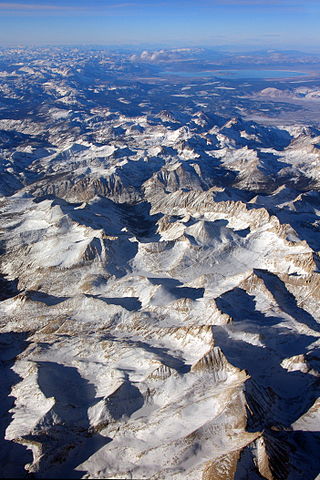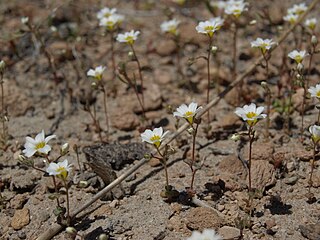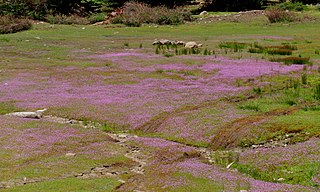
The Sierra Nevada is a mountain range in the Western United States, between the Central Valley of California and the Great Basin. The vast majority of the range lies in the state of California, although the Carson Range spur lies primarily in Nevada. The Sierra Nevada is part of the American Cordillera, an almost continuous chain of mountain ranges that forms the western "backbone" of the Americas.

Ipomopsis aggregata is a species of biennial flowering plant in the phlox family (Polemoniaceae), commonly known as scarlet trumpet, scarlet gilia, or skyrocket because of its scarlet red flowers with lobes curving back as if blown back by rocketing through the air.

Gilia tricolor is an annual flowering plant in the phlox family (Polemoniaceae).

The green longhorn is a lepidopteran from the moth family Adelidae, the fairy longhorn moths.

Gilia brecciarum is an annual flowering plant in the phlox family (Polemoniaceae), known by the common name Nevada gilia or break gilia.

Gilia capitata is a species of flowering plant in the phlox family known by the common names blue-thimble-flower, bluehead gilia, blue field gilia, and globe gilia.

The sheep moth, or common sheep moth, is a member of the family Saturniidae of silk moths and is native to western North America. In California, its range is west of the Sierran crest and the mountains of Southern California, ranging near to the coast. The moth is dayflying and appears in summer. It feeds on plants of three genera: Ceanothus, Rhamnus, and Rosa. Nuttall's sheep moth and one other species are similar, occurring in sagebrush areas east of the Sierra Nevada. The species was first described by Jean Baptiste Boisduval in 1852.

Gilia aliquanta is a species of flowering plant in the phlox family known by the common name puffcalyx gilia. It is native to the Sierra Nevada mountains and deserts of southeastern California and southern Nevada.

Linanthus inyoensis is a species of flowering plant in the phlox family known by the common name Inyo gilia.

Navarretia leptalea is a species of flowering plant in the phlox family known by the common name Bridges' pincushionplant.
Gilia salticola is a species of flowering plant in the phlox family known by the common name salt gilia. It is native to the Sierra Nevada and Modoc Plateau of California and western Nevada, where it grows in volcanic and granitic soils.

Raphia frater, the brother moth or simply the brother, is a moth of the family Noctuidae. It is found from Nova Scotia west, across the forested regions of Canada to British Columbia, south to Mississippi in the east. The southern limits in the west are uncertain due to confusion with several closely related species or forms.

Lasionycta benjamini is a moth of the family Noctuidae. It is found in the Sierra Nevada of California and in the mountains of Nevada and Colorado.

Lasionycta subalpina is a moth of the family Noctuidae. It is found from southern Idaho and the Beartooth Plateau on the Montana-Wyoming border to Colorado and central Utah as well as in the Sierra Nevada of California.
Gilia yorkii is a rare species of flowering plant in the phlox family known by the common names Boyden Cave gilia and monarch gilia. It is endemic to Fresno County, California, where it is known from only one location in the southern Sierra Nevada. This plant grows in rock cracks in the limestone cliffs and outcrops in the chaparral and woodlands of the canyon.

Ethmia arctostaphylella is a moth in the family Depressariidae. It is found in the United States and Mexico from southern Oregon and northern California, southward to the Sierra San Pedro Martir in Baja California and eastward in southern Nevada and Arizona. The range possibly extends northward in Oregon and into Utah following the distribution of its host plants.
Ethmia discostrigella, the mountain-mahogany moth, is a moth in the family Depressariidae. It is found from the western United States, south into Mexico.

Adela septentrionella is a moth of the family Adelidae or fairy longhorn moths. It was described by Walsingham in 1880. It is widespread from southern British Columbia and north-western Idaho to the Transverse Range in southern California.

Agriades podarce, the arrowhead Arctic blue, gray blue or Sierra Nevada blue, is a butterfly in the family Lycaenidae. It is found in North America from southern Oregon to central California in the Klamath Range and the Sierra Nevada. The habitat consists of subalpine meadows.














